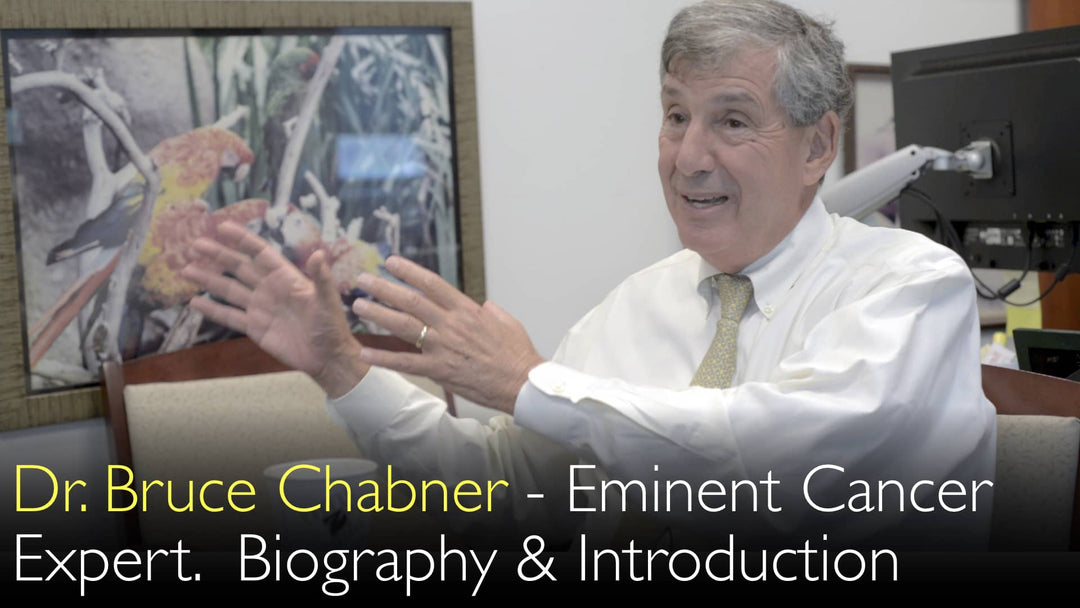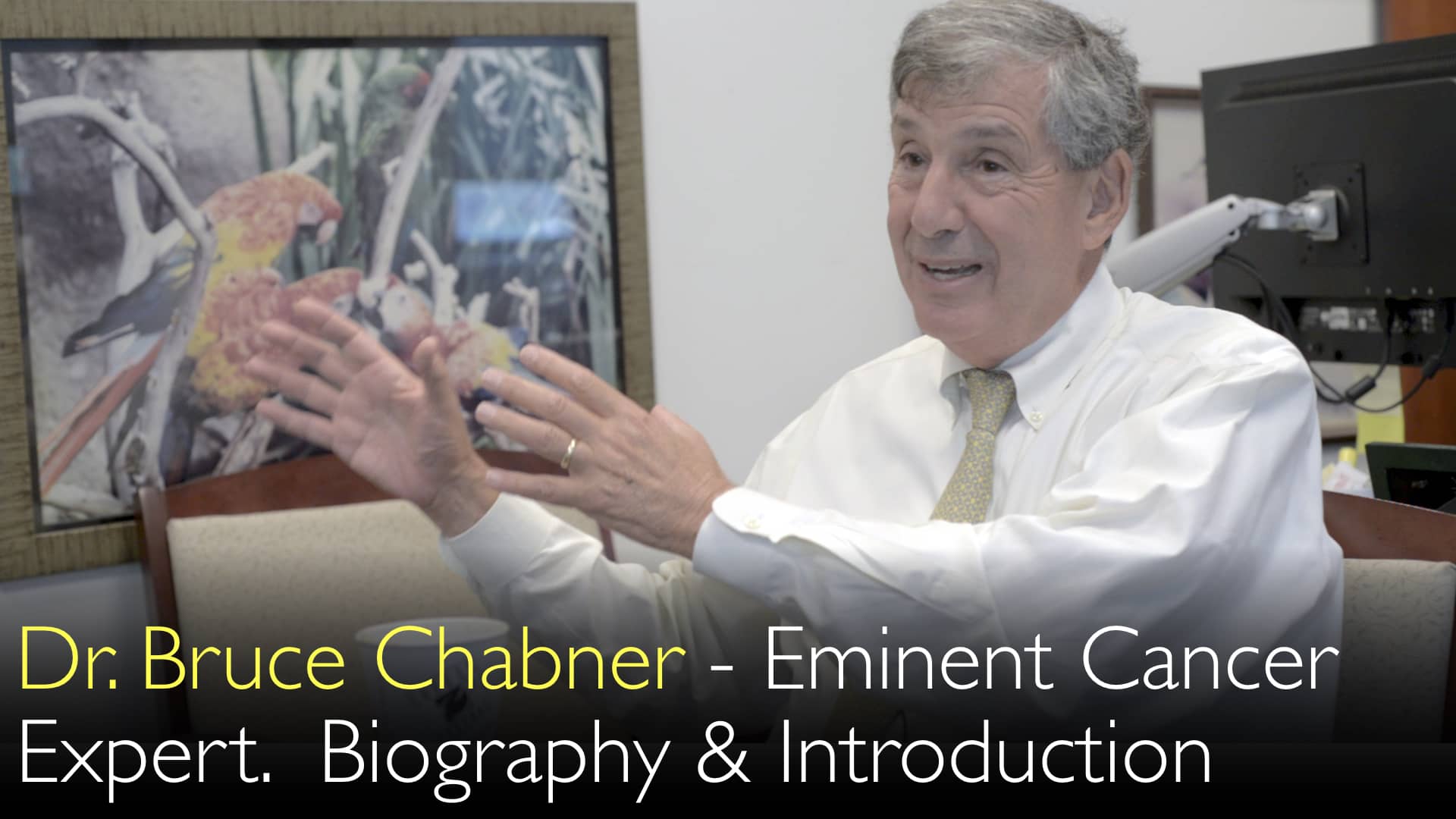Expert de renommée mondiale en recherche sur le cancer et en oncologie clinique, le Dr Bruce Chabner, MD, revient sur sa carrière déterminante de 50 ans. Il a contribué au développement de la chimiothérapie et dirigé d’importants services de recherche en cancérologie, marquant de son empreinte des avancées majeures comme le paclitaxel, un médicament anticancéreux salvateur. Il partage également sa vision d’une approche thérapeutique résolument centrée sur le patient.
Progrès dans le Traitement du Cancer et Perspectives d'un Oncologue de Renom
Aller à la Section
- Parcours et Axes de Recherche
- Contributions Majeures à la Recherche sur le Cancer
- Direction au National Cancer Institute
- Développement d'un Centre International de Cancérologie
- Distinctions et Reconnaissances Majeures
- Publications et Impact Éducatif
- Approche du Diagnostic et du Traitement du Cancer
- Transcription Intégrale
Parcours et Axes de Recherche
Le Dr Bruce Chabner, MD, est professeur de médecine à la Harvard Medical School et directeur émérite de la recherche clinique au Massachusetts General Hospital Cancer Center. Sa carrière remarquable en oncologie s'étend sur plus de cinq décennies, avec pour objectif constant d'améliorer la chimiothérapie anticancéreuse et les résultats pour les patients. Ses travaux visent à traduire efficacement la recherche fondamentale en traitements cliniques concrets pour les personnes atteintes de cancer.
Contributions Majeures à la Recherche sur le Cancer
Après son internat au Brigham and Women's Hospital, le Dr Bruce Chabner, MD, a rejoint le National Cancer Institute. Ses recherches y ont été novatrices, notamment ses études sur la résistance aux médicaments anticancéreux, un défi majeur en chimiothérapie. Ces travaux ont été essentiels pour comprendre pourquoi certains cancers cessent de répondre aux traitements et pour élaborer des stratégies visant à surmonter cet obstacle. Le Dr Anton Titov, MD, aborde ces contributions fondamentales lors de leur entretien.
Direction au National Cancer Institute
L'expertise du Dr Chabner l'a conduit à un rôle clé en tant que directeur de la Division du Traitement du Cancer au National Cancer Institute, poste qu'il a occupé pendant 13 ans. Dans cette fonction, il a supervisé le développement et l'approbation de nombreuses nouvelles thérapies anticancéreuses. Son leadership a été déterminant pour orienter les priorités et le financement de la recherche nationale sur le cancer vers les domaines les plus prometteurs du développement thérapeutique.
Développement d'un Centre International de Cancérologie
En 1995, le Dr Bruce Chabner, MD, a rejoint le Massachusetts General Hospital. Au cours des 20 années suivantes, il a joué un rôle central dans la transformation du MGH Cancer Center en une institution de renommée mondiale pour la recherche et le traitement clinique du cancer. Sa vision a permis d'allier une recherche de pointe à des soins compatissants centrés sur le patient, créant ainsi un modèle pour les centres complets de cancérologie à travers le monde.
Distinctions et Reconnaissances Majeures
Les contributions du Dr Chabner ont été saluées par les distinctions les plus prestigieuses en médecine. Il a reçu le prix David Karnofsky de l'American Society of Clinical Oncology en 1985, le prix Bruce Cain de l'American Association of Cancer Research en 1998, et a été nommé fellow de l'American Academy of Cancer Research en 2015. En reconnaissance exceptionnelle, il a été promu contre-amiral dans l'U.S. Public Health Service en 1991.
Publications et Impact Éducatif
Avec plus de 360 articles publiés et de nombreux manuels et chapitres sur la thérapie anticancéreuse, le Dr Bruce Chabner, MD, a eu un impact éducatif considérable en oncologie. Ses publications sont des références incontournables pour les étudiants en médecine, les fellows en oncologie et les praticiens, diffusant les connaissances sur les derniers protocoles de traitement et les avancées de la recherche. Le Dr Anton Titov, MD, souligne l'importance de cette œuvre majeure.
Approche du Diagnostic et du Traitement du Cancer
Au cours de son entretien avec le Dr Anton Titov, MD, le Dr Bruce Chabner, MD, met en avant une approche réfléchie et fondée sur les preuves pour le diagnostic et le traitement du cancer. Ses 50 ans d'expérience soulignent l'importance de la médecine personnalisée, qui tient compte de la biologie cancéreuse unique de chaque patient et de son état de santé général pour concevoir le plan de traitement le plus efficace et le moins toxique possible.
Transcription Intégrale
Dr. Anton Titov, MD: Le Dr Bruce Chabner est un éminent chercheur et oncologue clinicien. Il partage sa sagesse et son expertise acquises sur 50 ans. Comment aborder au mieux le diagnostic et le traitement du cancer ?
Bonjour de Boston ! Je suis le Dr Anton Titov, MD. Nous sommes en compagnie du Dr Bruce Chabner, professeur de médecine à la Harvard Medical School. Il est directeur émérite de la recherche clinique au Massachusetts General Hospital Cancer Center.
Le Dr Chabner a obtenu son diplôme avec les plus hautes distinctions de l'université Yale. Il est titulaire d'un MD de la Harvard Medical School. Il a effectué son internat au Brigham and Women's Hospital à Boston.
Le Dr Bruce Chabner, MD a ensuite rejoint le National Cancer Institute. Il y a mené des recherches déterminantes sur la résistance aux médicaments anticancéreux et la chimiothérapie. Par la suite, le Dr Bruce Chabner, MD est devenu directeur de la Division du Traitement du Cancer au National Cancer Institute, poste qu'il a occupé pendant 13 ans.
Le Dr Chabner est arrivé au Massachusetts General Hospital en 1995. Au cours des 20 dernières années et plus, le Dr Bruce Chabner, MD a développé le Cancer Center du MGH pour en faire un service de recherche et de traitement clinique du cancer de renommée internationale.
Les réalisations et distinctions du Dr Chabner sont trop nombreuses pour être toutes citées. Il a reçu le prix et la conférence David Karnofsky de l'American Society of Clinical Oncology en 1985. Il a reçu le prix Melville Jacobs de l'American Radium Society en 1986.
Il a reçu le prix Bruce Cain de l'American Association of Cancer Research en 1998. Il a été nommé fellow de l'American Academy of Cancer Research en 2015.
Le Dr Chabner a été promu au grade de contre-amiral dans le Public Health Service en 1991. Le Dr Bruce Chabner, MD a reçu de nombreuses récompenses et médailles en santé publique, dont sa plus haute distinction, la Distinguished Service Medal. Cette médaille lui a été décernée pour ses contributions au développement du paclitaxel.
Le Dr Chabner a publié plus de 360 articles sur la recherche et le traitement du cancer. Le Dr Bruce Chabner, MD est également l'auteur de nombreux chapitres et manuels sur la thérapie anticancéreuse.
Le Dr Chabner est marié à son épouse Davi-Ellen depuis 53 ans. Ils ont deux enfants et cinq petits-enfants.
Dr. Anton Titov, MD: Dr Chabner, bonjour et bienvenue !
Dr. Bruce Chabner, MD: Bonjour ! Comment allez-vous, Anton ?





